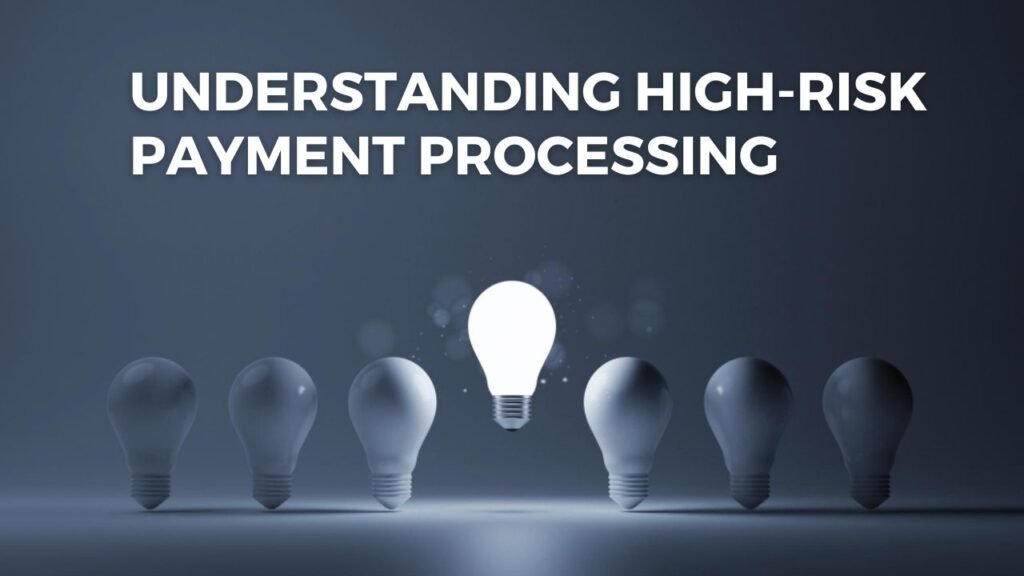Navigating High-Risk Processing: A Comprehensive Guide for Businesses

Processing payments is a critical aspect of any business. The term “high-risk processing” may ring familiar in certain industries or for specific types of companies. But what does it mean, and how can businesses effectively manage the risks and reap the rewards? This comprehensive guide will explore the ins and outs, providing valuable insights, tips, and FAQs to help businesses navigate this complex landscape successfully.
Understanding High-Risk Payment Processing

Payment processing is considered high risk when it involves industries or businesses deemed riskier by financial institutions due to the nature of the products or services offered, the chargebacks, legal and regulatory issues, or a history of fraud rates. High-risk businesses typically face more significant challenges in obtaining merchant accounts and may be subject to higher fees, stricter underwriting requirements, and more stringent regulations.
Some common industries that are often classified as high-risk include:
- Adult entertainment
- Online gaming and gambling
- Nutraceuticals and dietary supplements
- Pharmaceuticals
- CBD and cannabis products
- Online dating
- E-cigarettes and vape products
- Travel and tourism
- Debt collection
- Subscription-based services
Why Businesses Need High-Risk Processing

It can present both challenges and opportunities for businesses. While it may be more difficult to obtain merchant accounts and secure favorable processing terms, there is a compelling reason:
- Access to a Wider Customer Base:
It allows businesses to accept payments from customers who may not have traditional credit cards or bank accounts, expanding their customer base and revenue potential.
- Increased Sales Opportunities:
It enables businesses to accept payments online, which is essential in today’s digital economy. It can lead to increased sales, as customers prefer the convenience of online payments.
- Diversification of Payment Options:
It allows businesses to accept various payment methods, such as credit cards, debit cards, e-checks, and alternative payment methods, giving customers more options and increasing sales potential.
- Mitigation of Chargeback Risks:
These solutions often have built-in fraud prevention tools like risk scoring, address verification, and 3D Secure. These can help businesses reduce chargebacks and associated costs.
- Opportunities for Business Growth:
It can provide growth opportunities, especially in niche markets with less competition and higher profit margins.
Tips for Successful High-Risk Processing

While high-risk processing can be challenging, businesses can proactively manage the risks and maximize the benefits effectively. Here are some tips:
- Choose The Suitable Payment Processor: Selecting a payment processor with experience handling businesses is crucial. Look for processors specializing in your industry with a proven track record of providing reliable and secure solutions.
- Understand The Terms And Fees: It comes with higher prices and stricter terms, so it’s essential to thoroughly understand the pricing structure, contract terms, and any additional costs associated with the service. Compare multiple offers and negotiate favorable terms whenever possible.
- Implement Robust Fraud Prevention Measures: These businesses are more susceptible to fraud, so it’s critical to implement strong fraud prevention measures to protect your business and customers. Utilize tools such as risk scoring, address verification, and 3D Secure, and monitor transactions for suspicious activity regularly. Stay informed about the latest fraud trends and update your prevention strategies accordingly.
- Provide Excellent Customer Service: Provide excellent customer service to build trust and maintain customer loyalty. Promptly respond to customer inquiries and communicate clearly about payment processing, billing, and refund policies to minimize disputes and chargebacks.
- Maintain Accurate Records: Accurate records of all transactions, invoices, and customer information is essential. It helps with accounting and reconciliation and provides evidence in case of disputes or chargebacks.
- Stay Compliant With Regulations: They are often subject to stricter regulations, such as age verification, data privacy, and product restrictions. Stay updated with the relevant rules in your industry and ensure compliance to avoid penalties and legal issues.
- Build Relationships With Your Payment Processor: A solid relationship can benefit high-risk businesses. Maintain open communication, seek their guidance on fraud prevention strategies, and work together to resolve any issues or concerns that may arise.
Conclusion
High-risk processing can present challenges, but with the right strategies and partnerships, businesses can effectively manage the risks and capitalize on the opportunities. Companies can successfully navigate the complex landscape by selecting a payment processor with experience, implementing robust fraud prevention measures, maintaining excellent customer service, and staying compliant with regulations. Remember to thoroughly understand the terms and fees, keep accurate records, and build relationships with your payment processor to optimize your processing operations. With careful planning and execution, they can thrive and achieve their business goals in today’s competitive marketplace.
FAQs
Q: Is it challenging to get approved for high-risk processing?
A: Obtaining approval can be challenging due to the increased risks associated with specific industries. However, partnering with a payment processor specializing in high-risk businesses can increase your chances of approval.
Q: Are the fees for high-risk processing higher than regular processing?
A: It comes with higher fees due to the increased risks. It’s essential to thoroughly review and understand the pricing structure and negotiate favorable terms with your payment processor.
Q: Can high-risk processing help my business grow?
A: It can provide opportunities for business growth, especially in niche markets with less competition. Access to a broader customer base, increased sales opportunities, and diversification of payment options can contribute to business growth.
Q: How important is customer service in high-risk processing?
A: Customer service is crucial to building trust and maintaining customer loyalty. Promptly responding to customer inquiries, providing clear communication about payment processing, and addressing any issues or concerns can help minimize disputes and chargebacks.
Recent Posts
- Securing Your Small Business: Best Practices in Payment Security
- How Small Business Merchant Services Can Boost Your Bottom Line?
- The Impact of E-commerce on Small Business Merchant Services
- How Merchant Services Can Support Growth for Small Businesses
- Unlocking the Potential: The Pros and Cons of Open Source Retail POS Systems
Recent Comments
- สล็อต บาคาร่า on How Long Does a Credit Card Payment Take To Process?
- สล็อต บาคาร่า on How Long Does a Credit Card Payment Take To Process?
- digital marketing agency Sydney on How Long Does a Credit Card Payment Take To Process?
- EndoliftX on How Long Does a Credit Card Payment Take To Process?
- heng678 on How Long Does a Credit Card Payment Take To Process?
Comments are closed.